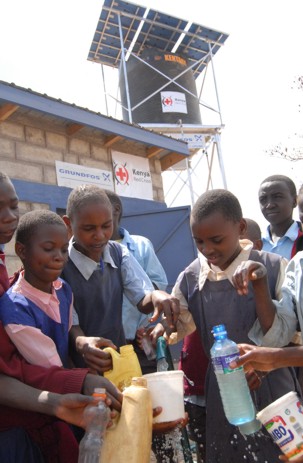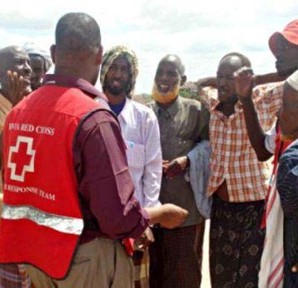|
Kenya Technology | Agriculture - Nutrition | Health E-payment for a cup of water in Kenya
Water supply to the village Kambi ya Juu, outside Isiolo in central Kenya 285 kilometres north of Nairobi, ended ten years ago. City authorities in Isiolo, faced with a strongly growing urban population, chose to use the scarce water resources within Isiolo and simply cut off the water to smaller villages surrounding the city.
Due to long-term drifting costs, a totally free provision of water to the villagers - who in some cases are totally deprived internally displaced persons - was never considered. afrol News tried to raise the ethical debate around charging money for basic services from impoverished societies with DRK spokesman Hans Beck Gregersen, but he declined to comment. But the price of water is kept as low as possible. "The price for 20 litres of clean water is 2 shilling - or less than euro 0.02," Frank Winther told afrol News. This is competitive, compared to public and private water utilities in Kenya. "The price only covers the actual running costs," assures Mr Winther. The running costs mainly include maintenance and the works of a local water committee running each pump system. In each village, the local community appoints a water committee among future users, which is given training to take over the responsibility of drifting and maintaining the water system. The committee also is to teach villagers "to change behaviour regarding hygienic standards," according to Carsten Mahnfeldt from the DRK. The water committee may look forward to sustainable revenue levels to finance its works and the well's maintenance. "By experience we know that 2,500 inhabitants use approximately 10,000 litres per day or 4 litre per person per day," says Mr Winther. That should produce annual revenues of around KSh 365,000 (euro 3,250) in Kambi ya Juu. The Grundfos spokesman assures afrol News there are no hidden costs for villagers or hidden revenues for the Danish company. "The installation of for example pump, solar-panel and the building of the unit on-site is donated by workers from Grundfos," he says. He adds that, "to our knowledge," there are also no major costs by using the mobile phone payment application for villagers. Barasa Mabonga, a representative from the Kenyan Red Cross, says the solution more than lives up to the expectations they had when looking for a viable solution to the water crisis in the Isiolo district. "It is no doubt the best system, I have ever seen," Mr Mabonga comments ahead of Tuesday's inauguration ceremony in Kambi ya Juu. Also the Danish Red Cross is satisfied with the project, and has committed to assist the installation of the system in "at least" nine more Kenyan localities by 2012. "Thereafter, possible next steps regarding implementation of further water projects in new regions will be decided," the DRK announced today. By staff writers © afrol News - Create an e-mail alert for Kenya news - Create an e-mail alert for Technology news - Create an e-mail alert for Agriculture - Nutrition news - Create an e-mail alert for Health news
On the Afrol News front page now
|
front page
| news
| countries
| archive
| currencies
| news alerts login
| about afrol News
| contact
| advertise
| español
©
afrol News.
Reproducing or buying afrol News' articles.
You can contact us at mail@afrol.com









